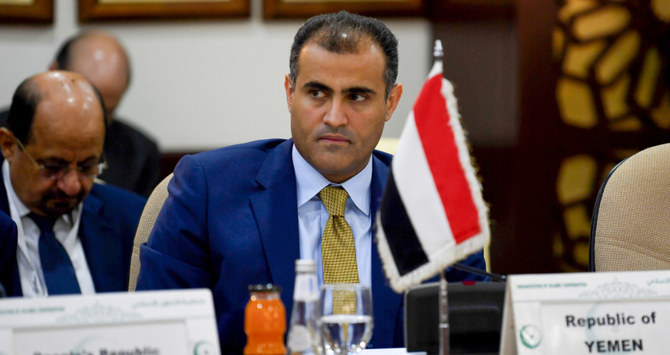
- ARAB NEWS
- 26 Apr 2024

AL-MUKALLA: The internationally recognized government of Yemen has once again accused Iran of undermining security in Yemen and other countries by supplying arms and funds to its allied militias.
Speaking at a virtual Arab League session on Wednesday, Yemeni Foreign Minister Mohammed Al-Hadrami said the Iranian regime poses a grave threat to stability and security in the Arab world and that the Iran-backed Houthi militia fuels his country’s worsening humanitarian crisis.
“Iran has caused great harm to Yemen and the region, as it uses the wealth of its people to arm and finance a militia outside its territory to blatantly interfere in the internal affairs of Arab countries,” the Yemeni minister said, adding that his government has sought a peaceful solution to end the Houthi coup against the internationally recognized government and the Houthis’ military expansion in Yemen.
Yemeni governments have long accused Iran of arming and financing the Houthi rebellion in Yemen that has claimed thousands of lives.
Following the interception of arms shipments to the Houthis, the Yemeni government have asked the international community to impose harsher sanctions on the Iranian regime in order to curb its military support to militias in the region, including the Houthis.
In regard to the Stockholm Agreement, Al-Hadrami stressed that his government would not allow the Houthis to take advantage of a truce in the western city of Hodeidah under the agreement to escalate military operations in other parts of the country, including Marib and Jouf.
“Due to the continuing intransigence of the Houthis, we realized today that the agreement is useless and did not lead to anything. Rather, it turned into a new phase of escalation, exacerbation of the conflict, and increased the suffering of Yemenis,” the minister said.
He highlighted threats including the rusting oil tanker in the Red Sea and Houthi looting of humanitarian supplies.
Meanwhile, more than 25 Houthis have been killed and more than 30 others captured since Wednesday morning in the northern province of Jouf, Rabia Al-Qurashi, the Yemeni army spokesman in the province, told Arab News on Thursday.
Backed by hundreds of tribesmen and under air cover from Arab coalition planes, the Yemeni army launched an offensive on Houthi-controlled areas east of Hazem, the capital of Jouf province. The army pushed 15 kilometers into a large desert area in the province after killing and capturing dozens of Houthis.
“By taking complete control of Al-Nodhoub and liberating neighboring areas, we secured the northern side of the city of Marib from Houthi incursions,” Al-Qurashi said by telephone. A large number of tribesmen from Dahem and Abeda tribes took part in the fighting along with army troops, Al-Qurashi said, adding that the army seized five armed vehicles and coalition aircraft destroyed several others.
In addition to expelling the Houthis from Jouf, military operations in the province are also intended to ease Houthi military pressure on government forces in the neighboring Marib province, Yemeni military commanders say.
Al-Qurashi said that government troops achieved that objective on Thursday by cutting off Houthi supply lines from parts of Jouf.
In the central province of Marib, Yemen’s Defense Ministry said fierce fighting erupted over recent days as the Houthis tried to take control of various areas.
On Wednesday, Yemeni media said that Brig. Gen. Rashad Mohammed Al-Hakimi, commander of 3rd Border Guard Brigade operations, was killed in action against the Houthis in an undisclosed location.